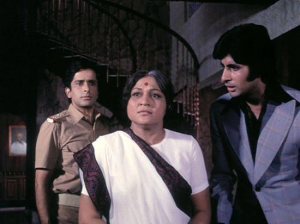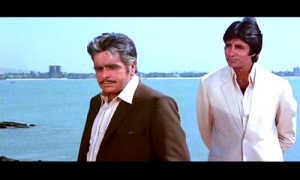Tamil cinema, from its earliest days of silent films, maintained a ‘Cinema of the Other’ stance in the Indian film scenario. The industry started in 1917, with the silent film Keechaka Badham (The Slaying of Keechaka), Produced and Directed by R Nataraja Mudaliar. He made another film, Draupadi Vastrapaharanam (Unrobing of Draupadi), in the same year. It is significant to note the first two films made in South India concentrated on particular portions of Mahabharata that dealt with the obnoxious, producing an emotion with Bibhatsa rasa in the audience’s mind. However, the ventures met with applause and were financially successful.
In the other two hubs of Indian Film making, Bombay and Calcutta (as they were called then), the stress was on the mythological and sometimes historical, but never so much on the portrayal of the grotesque and the abhorred. Does this point to a particular tendency of Tamil Cinema, and in general to Tamil cultural psyche?
Tamil people, even under the British, were keen to keep their identity separate from the people of the North. And any part of India, northern to Madras in the east, Hyderabad in the Central and Mysore in the Western side, was considered as North India, except some southern portion of Bengal (modern day Orissa) and Southern portions of Konkan and Bombay. During the British period, specially before World War II, modern Tamil Nadu became pro-British and actually helped in motivating Indians to join the War by making propaganda features favouring the rulers. Films like Manasamrakshanam (1944) or Burma Rani (1945), represented a common trend in Tamil film industry those days.
The politics of we and they was always a part of Tamil civilization, that raised its head in a big way immediately after independence. In 1949, the germ of Tamil independence took a bigger form in Periyar Ramsami’s pro-Dravidian (and anti-Aryan) identity movement, culminating the formation of DMK (Dravida Munnetra Kazhakam). A new batch of filmmakers joined the industry then, who would appropriate the pro-Dravidian sentiment in their own ways for political gains. Among them, the most notable ones were the charismatic scriptwriter and playwright C N Annnadurai, story and scriptwriter M Karunanidhi, Matinee Idol M G Ramachandran and his protégé, Screen Goddess J Jayalalitha.
It’s a general tendency among humans to search for a leader. Once begotten, the leader is unquestionably followed till the individual is a part of the mass-hysteria. Organized religions work on this principle. So do magic and politics. South Indians rarely came under any foreign ruler before the British. Even the Maurya or the Gupta Empire never directly influenced them. And everyone knows how the the Mughal Emperors’ attempts at capturing South India kept failing for over six hundred years. So it wasn’t surprising that the Tamil would want an autonomy after their sole conqueror in history, the British, left. When that did not happen as per their choice, they revolted. Part of the revolution centered on creating a strong cultural identity in the name of Tamilalakam (Tamil land) which upheld Dravidian culture using stage drama, poetry, literature, myth, history, musicals, dance and, most importantly, cinema.
Tamil society, an ideal example of an unchanged patriarchal one, maintained a very strong identity of the male, almost opposite to the one maintained in the rest of the Indian movies. Who is the ideal Tamil hero? He must have moustache, physical prowess, authority, sexual virility and the capacity to control women. It must be noted that except for the moustache, the other character traits are not very different from the rest of the heroes in India. However, the portrayal and the political purpose were very different.
Tamil hero of the pro-Dravidian camp rejects all finesse that he considers to be part of the Aryan culture, and hugs the grotesque instead. In that way, Tamil heroes can be equated with the villains of the North-Indian myths and epics. An obsession with the denial of the other and embracing the grotesque and violent uprooting of all non-Dravidian values from culture led to a cinema of sophisticated violence and other basal instincts in Tamil Nadu.
While in films like Velaikari (1949) and Ratha Kanneer (1954), both penned by Annadurai, showed the hero’s faults as the result of his encounter with other cultures, especially North Indian culture (the vamp had to die in the second film, as she was trying to get into a relationship with a Hindi-speaking character from Bombay). It was Parashakti (1952) which was made to show the superiority of Tamil culture over others. In this film women were given an unambiguous role of being the knowledgeable, spirited and intelligent support to their male counterparts. That never meant women were independent. They were just supports, like obedient servants, who should find their place inside the home.
This made a great difference between the progressive heroine from North India and the Tamil heroine. While the former wanted equality and freedom with education and free will, the latter accepted the choice of her family. In effect, this made the outside world a jungle for man-hunting for the Tamil hero.
And the heroines, unlike their North Indian counterparts, went through literal purification, punishment or death if they chose liberation. In Rudraiah’s 1978 film Aval Appadithan (That’s the Way She Is), the heroine ends up homeless in the end and her journey throughout the film is portrayed as obnoxious. So we see a very strange concoction of Shringara and Bibhatsa rasas at work even, sixty years after it started.
In modern Tamil Cinema, the trend continues through a different guise. In a celebrated film like Veyil (2006) or the Kamal Hassan starrer Vettaiyadu Vilaiyadu (2006), the hero achieves his target through extreme violence. But is it not violence and grief that lead to the purification of the soul? Maybe future Tamil Cinema will answer this question more directly.
Filed under: Film Industry | Tagged: acting, actor, behind the scenes, Bollywood, box office, film, film industry, film making, film trade, film-maker, films, Kamal Hasan, movie, sound effects, speech delivery, stardom, talent, Tamil, Tamil films, writing | 5 Comments »

















 Dale Bhagwagar began his journey as a journalist twenty-three years ago, when he was just 14 years old. He contributed articles, poems to local newspapers and magazines in his hometown, Nagpur. Six years later, he joined a local newspaper as a trainee Sub-Editor and Reporter. After completing his graduation in English Literature he moved to Mumbai and was soon hired as the Chief Sub-Editor cum Reporter for the Bollywood gossip magazine “Cine Blitz”, which dealt with yellow journalism. That was the turning point in his life where he learnt the trick and trade of manipulating “Star images”. He is instrumental in shaping the careers of many celebrities. He has handled the PR for the likes of Hrithik Roshan, Shilpa Shetty, Priyanka Chopra, Esha Deol, Shiney Ahuja, Randeep Hooda and Vivek Oberoi, among 50 others.
Dale Bhagwagar began his journey as a journalist twenty-three years ago, when he was just 14 years old. He contributed articles, poems to local newspapers and magazines in his hometown, Nagpur. Six years later, he joined a local newspaper as a trainee Sub-Editor and Reporter. After completing his graduation in English Literature he moved to Mumbai and was soon hired as the Chief Sub-Editor cum Reporter for the Bollywood gossip magazine “Cine Blitz”, which dealt with yellow journalism. That was the turning point in his life where he learnt the trick and trade of manipulating “Star images”. He is instrumental in shaping the careers of many celebrities. He has handled the PR for the likes of Hrithik Roshan, Shilpa Shetty, Priyanka Chopra, Esha Deol, Shiney Ahuja, Randeep Hooda and Vivek Oberoi, among 50 others. Mr. Bhagwagar also advised the students to have dreams and then create roads to reach for those dreams. He said that you must be sure of your goals and then set a basic pattern and time frame to achieve those goals and carve a niche in the field you are interested in. He cited that “You have to stick to your roots, think of the sky and grow”. He also said that PR is just 10%, the remaining 90% is the talent you possess, you should be better filmmakers and the rest follows.
Mr. Bhagwagar also advised the students to have dreams and then create roads to reach for those dreams. He said that you must be sure of your goals and then set a basic pattern and time frame to achieve those goals and carve a niche in the field you are interested in. He cited that “You have to stick to your roots, think of the sky and grow”. He also said that PR is just 10%, the remaining 90% is the talent you possess, you should be better filmmakers and the rest follows. Mohit Suri is an Indian Film
Mohit Suri is an Indian Film  As a
As a  Ashok Mehta, one of India’s most respected cinematographers, ran away from home and school in Delhi, in the 70s to pursue his dream of becoming an Actor. However, on arriving, he realized that life here was a struggle. He saw no point in returning home empty handed. So he started off as a canteen boy, worked as a hawker, a light man, a camera attendant, before he finally became a cameraman. With “36 Chowrangee Lane” he had his first tryst with recognition as a
Ashok Mehta, one of India’s most respected cinematographers, ran away from home and school in Delhi, in the 70s to pursue his dream of becoming an Actor. However, on arriving, he realized that life here was a struggle. He saw no point in returning home empty handed. So he started off as a canteen boy, worked as a hawker, a light man, a camera attendant, before he finally became a cameraman. With “36 Chowrangee Lane” he had his first tryst with recognition as a  Mahesh Nair is a Writer and
Mahesh Nair is a Writer and  If you are a writer, go about it discover your true calling and write. This also applies to the other facets of your profession, if filmmaking excites you and gives you creative satisfaction, just shoot. Exploring different avenues of your abilities and frequently working on it is an added advantage in possessing your skills. The reaction you get from people helps in building a strong foundation as a filmmaker, it makes you aware of your own pitfalls.
If you are a writer, go about it discover your true calling and write. This also applies to the other facets of your profession, if filmmaking excites you and gives you creative satisfaction, just shoot. Exploring different avenues of your abilities and frequently working on it is an added advantage in possessing your skills. The reaction you get from people helps in building a strong foundation as a filmmaker, it makes you aware of your own pitfalls.